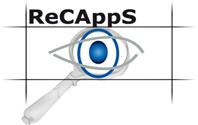ReCAppS: Remote Controlled Application System

With ReCAppS users can perform critical actions without endangering its own internal systems, which provides efficient and secure IT environments. Active code, no matter where that is and how it is packaged, will automatically be in an "unsafe area".
1. The integrated local lock:
Decryption and recursive decompression of files are realized in a local quarantine. There the contents are checked in clear text. Depending on the result and according to centrally defined guidelines single filters are either blocked, safely deleted or passed over to a third party for further investigation. User access during inspection will be technically prevented. Therefore the computer may not be infiltrated by malicious code. Additional Hardware and prolonged walks are not necessary anymore.
2. The virtualized lock:
From the users point of view truly efficient work environments demand the possibility to execute critical actions immediately. Critical actions could be the very simple clickon a problematic URL, downloading executables from the Internet or installing nameless applications from an unknown data storage device. For secure operation of browsers the BSI (German Federal Office of Information Security) presented ReCoBs, a concept which allows safe internet surfing through outsourcing the browser execution into a DMZ. The itWatch solution uses this process not only for secured operation of browsers but for all unplanned actions which are relevant to security:
- Automatic outsourcing and execution an a virtualized environment behind firewalls or in the cloud.
- Handling or view of critical data that has to be imported to the client from foreign data storage devices or unsecure applications.
Challenges:
- By clicking the link in a "friend's" email a worm, Trojan or any other malware is being installed.
- USB sticks or CDs that were handed over during an event may contain spyware to collect your data and upload it encrypted via https into the internet.
- Your communication partner passes you sensible data encrypted on an USB stick. How can you make sure, that the data does not contain risky macros?
- Hacked web pages of respectable companies didtribute malware i.e. BBC (TecChannel 17.02.2011)
- Content filters at gateways or on firewalls are only effective regarding data in clear text - for the reason of data privacy protection often the SSl encryption of the traffic must not be broken.
- Sensitive information is being published at Wikileaks or fall into competitors hands.

